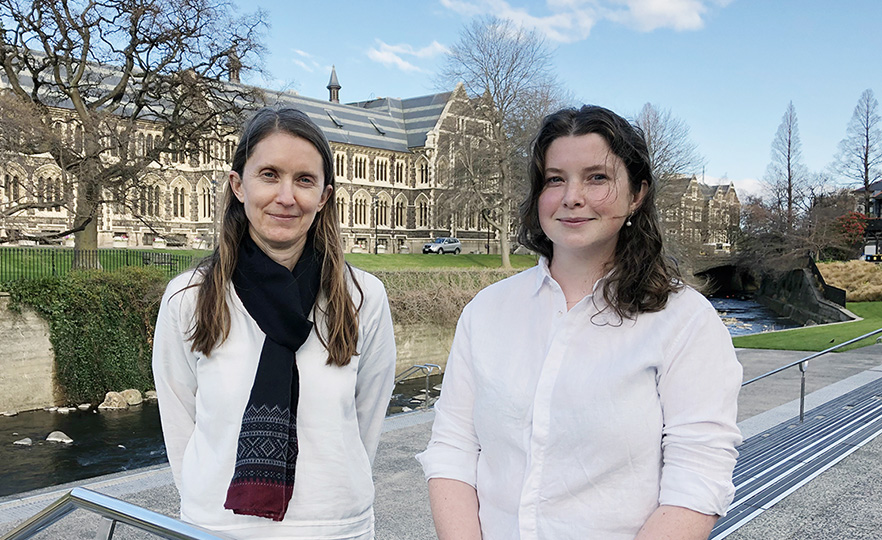
Dr Inga Smith and Anna Tarr.
Carbon dioxide emissions from passenger travel to and from New Zealand rose by 60 per cent from 2007 to 2017, a University of Otago study has revealed.
When split into the components from international visitors and New Zealand residents, the increases were 48 per cent and 86 per cent, respectively.
Total combined passenger numbers and distance travelled only rose by 46 per cent over this period, so the 60 per cent rise in passenger emissions surprised the researchers because of expectations that aeroplanes have become more efficient over time.
In the study, published in Environmental Research Communications, the researchers used commercially sensitive fuel use, comparing it to data from earlier research, developing an emissions calculation method which can be applied for both passenger and freight emissions to other nations or regions.
New Zealand's emissions factor for short-haul travel has remained relatively constant since 2007, at 0.81 kg CO2 per t-km, while the long-haul emissions factor increased by 14 per cent to 0.79 kg CO2 per t-km in 2017.
The country's 2017 international aviation CO2 emissions were 8.4 Mt CO2 in total; international visitor travel to and from New Zealand accounted for 4.3 Mt CO2, New Zealand residents' international travel 2.6 Mt CO2, exports 0.72 Mt CO2, and imports 0.89 Mt CO2. When freight was included, the total CO2 emissions were estimated to have increased by over 50 per cent since 2007.
The leader of the research team, Dr Inga Smith of the Department of Physics, says the increase in emissions was more than could be explained by just an increase in the number of travellers, amount of freight, and distances flown.
“The fact that the long-haul emissions factor increased, and the short-haul emissions factor was largely unchanged surprised us because we'd heard that aircraft were getting more efficient over time.
“This apparent decrease in the efficiency of aeroplanes servicing New Zealand, across 21 airlines, seems to be due to operational factors such as seating density,” she says.
Lead author Assistant Research Fellow Anna Tarr says the public is probably not aware of the scale of aviation emissions for New Zealand.
“We are a geographically remote nation, and as COVID-19 has shown, very dependent on international aviation for the movement of people and goods into and out of the country.
“Our estimates of CO2 alone in 2017 would add approximately an additional 10 per cent to the nation's gross emissions if they were accounted for and attributed to New Zealand,” she says.
Knowing the impact burning fossil fuels has on the climate, Dr Smith finds it concerning there is not an internationally agreed way to effectively deal with the aviation emissions.
“Globally, aviation accounts for more than 2 per cent of global emissions – if aviation were a country, it would be one of the top 10 emitters of greenhouse gases – but no country is liable for international aviation emissions.
“The issue is that domestic aviation emissions were subject to Kyoto Protocol liabilities, but international aviation emissions were not, nor are they directly addressed by the Paris Agreement. Global ambitions to limit climate change rely on quantification of emissions, but it is very challenging to access data to estimate international aviation emissions associated with individual countries.”
Tarr says greenhouse gases are having a detrimental impact on the environment.
“I believe that policy makers and the aviation industry need to address this data issue, and also implement existing solutions to reduce emissions.”
Publication details:
Carbon dioxide emissions from international air transport of people and freight: New Zealand as a case study
Anna P Tarr, Inga J Smith, and Craig J Rodger
Environmental Research Communications
For more information please contact:
Dr Inga Smith
Department of Physics
University of Otago
Email inga.smith@otago.ac.nz
Ellie Rowley
Communications Adviser
University of Otago
Mob +64 21 278 8200
Email ellie.rowley@otago.ac.nz
Find an Otago Expert
Use our Media Expertise Database to find an Otago researcher for media comment.
